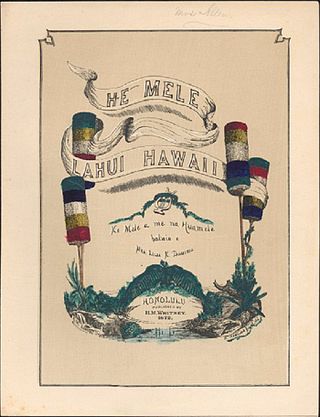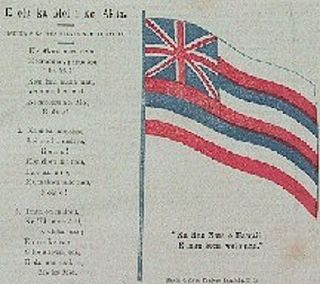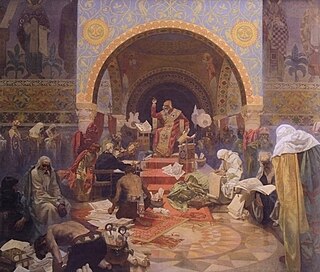An anthem is a musical composition of celebration, usually used as a symbol for a distinct group, particularly the national anthems of countries. Originally, and in music theory and religious contexts, it also refers more particularly to short sacred choral work and still more particularly to a specific form of liturgical music. In this sense, its use began c. 1550 in English-speaking churches; it uses English language words, in contrast to the originally Roman Catholic 'motet' which sets a Latin text.

"God Save the King" is the national anthem of the United Kingdom and the British Crown Dependencies, one of two national anthems of New Zealand since 1977, and the royal anthem of most Commonwealth realms. The author of the tune is unknown and it may originate in plainchant, but an attribution to the composer John Bull has sometimes been made.

"God Save the Tsar!" was the national anthem of the Russian Empire. The song was chosen from a competition held in 1833 and was first performed on 18 December 1833. It was composed by violinist Alexei Lvov, with lyrics written by the court poet Vasily Zhukovsky. It was the anthem until the February Revolution of 1917, after which "Worker's Marseillaise" was adopted as the new national anthem until the overthrow of the Russian Provisional Government by the Bolsheviks in the October Revolution of the same year.

The Year 1812, Solemn Overture, Op. 49, popularly known as the 1812 Overture, is a concert overture in E♭ major written in 1880 by Russian composer Pyotr Ilyich Tchaikovsky. The piece commemorates Russia's successful defense of the French invasion of the country by Napoleon in 1812.

"Gott erhalte Franz den Kaiser" was a personal anthem to Francis II, Emperor of the Holy Roman Empire and later of the Austrian Empire, with lyrics by Lorenz Leopold Haschka (1749–1827) and music by Joseph Haydn. It is sometimes called the "Kaiserhymne". Haydn's tune has since been widely employed in other contexts: in works of classical music, in Christian hymns, in alma maters, and as the tune of the "Deutschlandlied", the national anthem of Germany.
Wanderer, Wanderers, or The Wanderer may refer to:
"Let the Thunder of Victory Rumble!" was an unofficial Russian national anthem in the late 18th and early 19th century.

"Heil dir im Siegerkranz" was the Kaiserhymne of the German Empire from 1871 to 1918 and royal anthem of Prussia from 1795 to 1918.

The Marche slave in B-flat minor, Op. 31, is an orchestral tone poem by Pyotr Ilyich Tchaikovsky published in 1876. It was written to celebrate Russia's intervention in the Serbo-Ottoman War.
Allahu Akbar is an Islamic phrase, called Takbir in Arabic, meaning "Allah is greater" or "Allah is [the] greatest".
"The Prayer of Russians" is a song that was used as the national anthem of Imperial Russia from 1816 to 1833.

"He Mele Lāhui Hawaiʻi" was composed by Liliʻuokalani in November 1866 at the request of Kamehameha V, who wanted a national anthem to replace the British anthem "God Save the King". It replaced Lunalilo's composition "E Ola Ke Aliʻi Ke Akua" as the national anthem. Liliʻuokalani wrote: "The king was present for the purpose of Criticising my new composition of both words and music, and was liberal in his commendations to me on my success. He admired not only the beauty of the music but spoke enthusiastically of the appropriate words, so well adapted to the air and to the purpose for which they were written. This remained in use as our national anthem for some twenty years or more when my brother composed the words Hawaiʻi Ponoʻī."
"God Save the Queen" is the national anthem of the United Kingdom and the royal anthem of most Commonwealth realms, when there is a female monarch.

"E Ola Ke Aliʻi Ke Akua" was one of the four national anthems of the Hawaiian Kingdom. It was composed in 1860 by then 25-year-old Prince William Charles Lunalilo, who later became King Lunalilo. Prior to 1860, Hawai‘i lacked its own national anthem and had used the British royal anthem God Save the King. A contest was sponsored in 1860 by Kamehameha IV, who wanted a song with Hawaiian lyrics set to the tune of the British anthem. The winning entry was written by Lunalilo and was reputed to have been written in 20 minutes. Lunalilo was awarded 10 dollars which he later donated to the Queen's Hospital. His composition became Hawaiʻi's first national anthem. It remained Hawaiʻi's national anthem for 6 years until 1866, when it was replaced by Queen Liliʻuokalani's composition He Mele Lāhui Hawaiʻi.

The coronation of the emperor of Russia from 1547 to 1917, was a highly developed religious ceremony in which they are crowned and invested with regalia, then anointed with chrism and formally blessed by the church to commence his reign. Although rulers of Muscovy had been crowned prior to the reign of Ivan III, their coronation rituals assumed overt Byzantine overtones as the result of the influence of Ivan's wife Sophia Paleologue, and the imperial ambitions of his grandson, Ivan the Terrible. The modern coronation, introducing "Western European-style" elements, replaced the previous "crowning" ceremony and was first used for Catherine I in 1724. Since tsarist Russia claimed to be the "Third Rome" and the replacement of Byzantium as the true Christian state, the Russian rite was designed to link its rulers and prerogatives to those of the so-called "Second Rome" (Constantinople).
The Festival Coronation March in D major, TH 50, ČW 47, is an orchestral work by Peter Ilyich Tchaikovsky ordered by the city of Moscow for the coronation of Tsar Alexander III in 1883. It was written during March 1883 and performed for the first time on June 4[O.S. May 23], 1883 in Sokolniki Park (Moscow), conducted by Sergei Taneyev. The music included excerpts of the anthem God Save the Tsar. Recordings of this piece generally run between 5 and 5½ minutes.

Tsar, also spelled czar, tzar, or csar, was a title used by East and South Slavic monarchs. The term is derived from the Latin word caesar, which was intended to mean "emperor" in the European medieval sense of the term—a ruler with the same rank as a Roman emperor, holding it by the approval of another emperor or a supreme ecclesiastical official —but was usually considered by Western Europeans to be equivalent to "king". It lends its name to a system of government, tsarist autocracy or tsarism.
A National Anthem is a country's national song.









